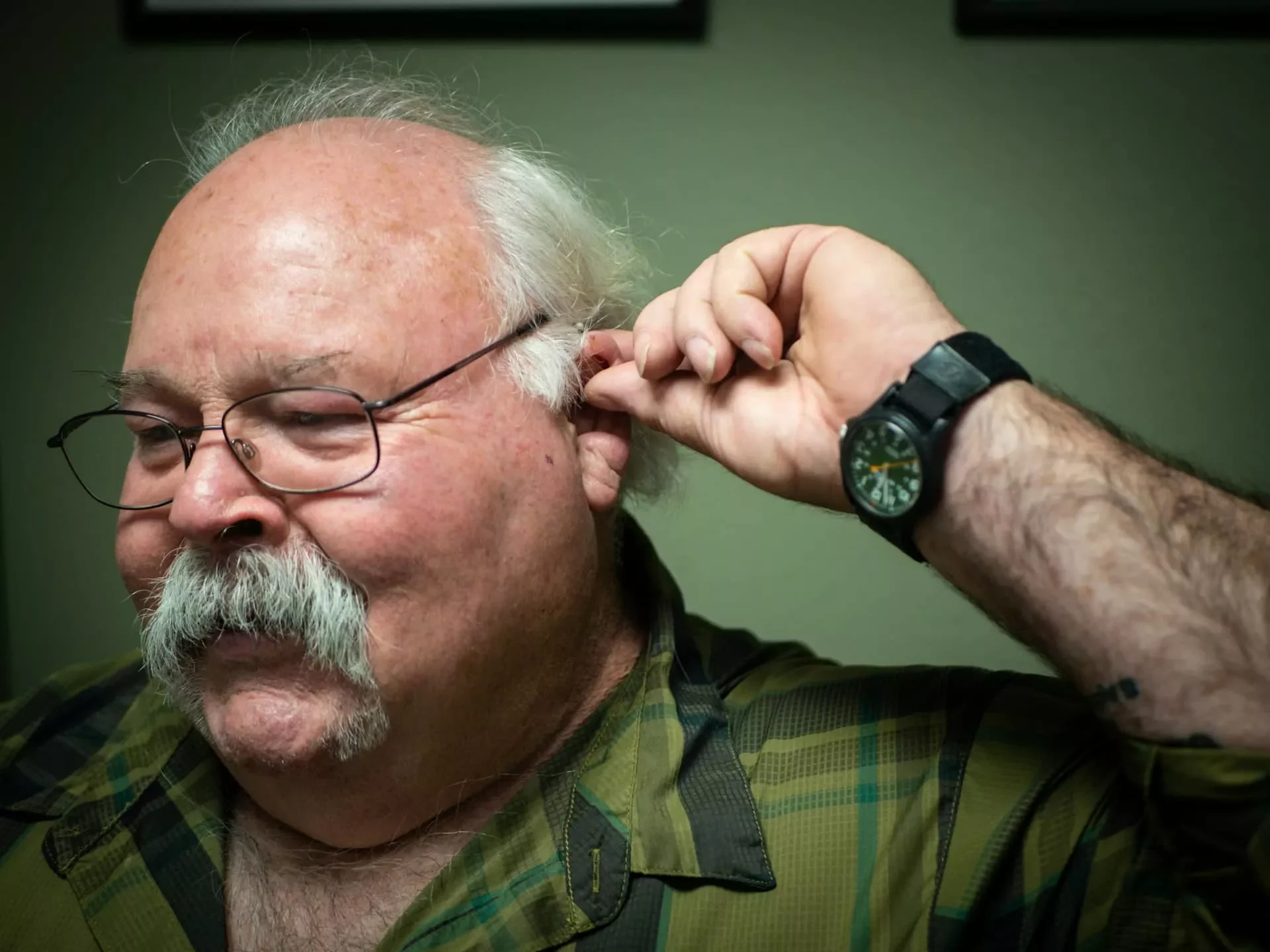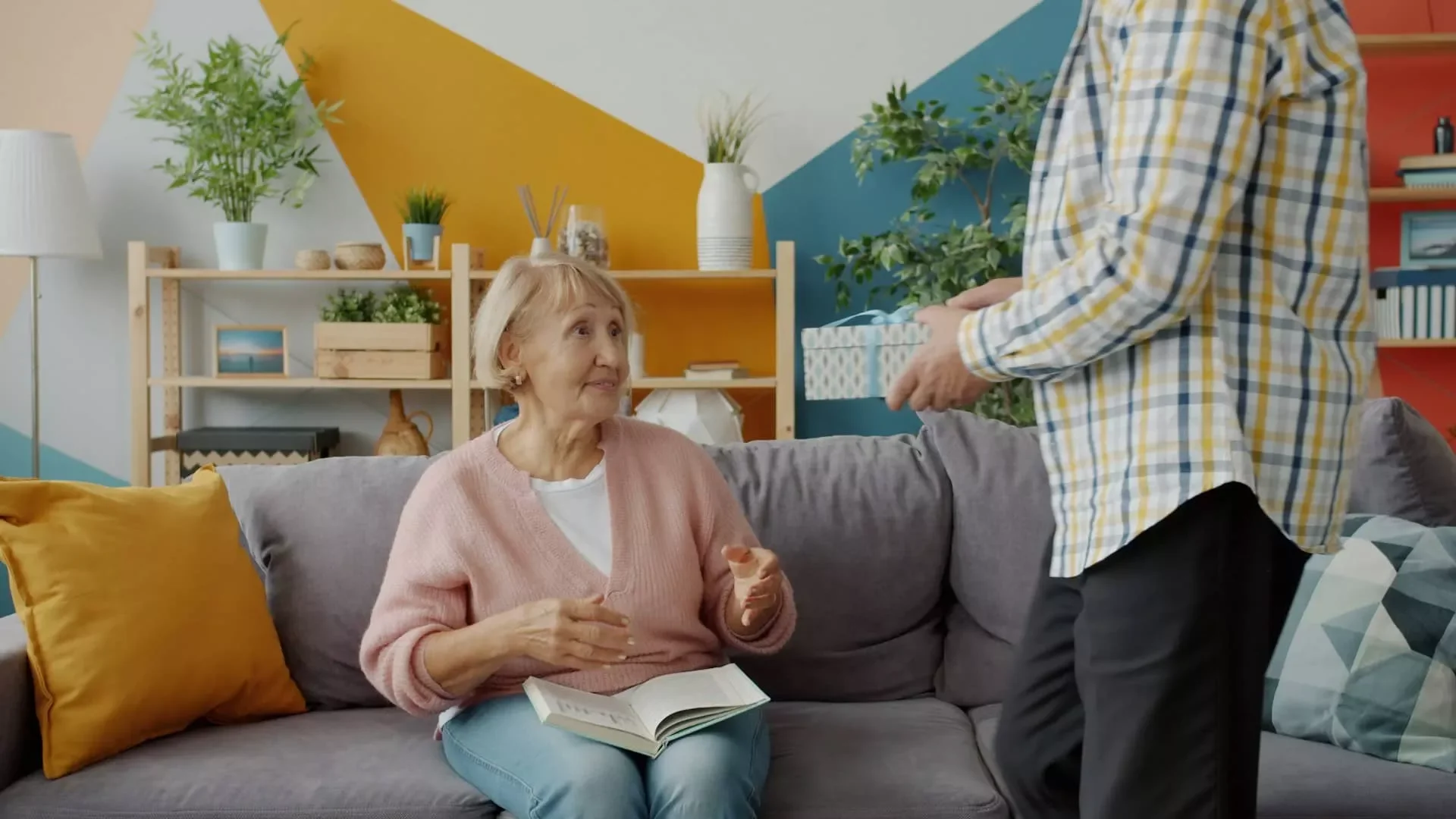Parkinson's Disease Speech Therapy in Lake Worth, FL
Have conversations become exhausting? Does your family lean in closer, asking "what did you say?" Are you skipping social events because talking feels like too much work?
You're not alone, and there's real help available.
Nina Minervini, M.S., CCC-SLP provides evidence-based Parkinson's voice and speech rehabilitation in Lake Worth homes.
Nina specializes in helping adults with Parkinson's disease strengthen communication, restore vocal power, and reconnect with the people and activities they love.
Early Intervention for Parkinson’s Communication Changes
If you want to stay ahead of voice, swallowing, or thinking-related changes, Nina offers an early-intervention Parkinson’s communication and swallowing program.
It includes SPEAK OUT!® voice therapy along with practical swallowing strategies you can use daily.
In-Home Parkinson’s Speech Therapy in Lake Worth Beach
Contact Nina through this short form, and she will call or email you within 24 hours to discuss speech therapy for Parkinson’s with sessions taking place at your Lake Worth home.
The Reality of Parkinson's and Communication
Here's what many people don't realize: nearly 9 out of 10 individuals with Parkinson's will face speech or voice difficulties at some point. This isn't a sign of disease progression you need to accept. It's a treatable symptom that responds remarkably well to targeted intervention.
What Happens to Your Voice with Parkinson's
Parkinson's disease creates a kind of dysarthria clinicians call "hypokinetic dysarthria,” which is a fancy term for reduced movement in the muscles that power speech.
The basal ganglia (your brain's movement control center) struggles to coordinate the intricate choreography of breathing, vocal cord vibration, and articulation.
The result? Speech that requires enormous effort but produces minimal volume.
But here's the twist: most people with Parkinson's genuinely believe they're speaking at normal loudness. Your brain's perception is off-calibration, so when family says "speak up," it feels like you're already shouting.
How Parkinson's Changes the Way You Communicate
You might notice one, several, or many of these changes:
Volume and Power Issues:
Your voice barely carries across a room
Background noise (restaurants, gatherings) makes you impossible to hear
Speaking on the phone has become nearly impossible
You feel like you're yelling, but others say you're whispering
Clarity and Articulation Challenges:
Words run together or sound "mushy"
Consonants blur and people mishear what you're saying
Your jaw and lips feel tight and uncooperative
Starting to speak takes conscious effort
Vocal Quality Changes:
Your voice sounds hoarse, breathy, or strained
There's a shakiness or tremor in your speech
You've lost the natural melody and inflection in your voice
Everything sounds flat and monotone
Rhythm and Pacing Problems:
You start speaking too fast, then trail off
Words rush out uncontrollably (festinating speech)
Pauses happen in odd places mid-sentence
Maintaining steady speech rhythm feels impossible
The Emotional Toll:
Avoiding phone calls and social invitations
Letting others speak for you
Feeling invisible in group conversations
Watching relationships strain under communication frustration
This doesn't have to be your reality. Research consistently demonstrates that speech therapy (especially intensive, specialized programs) produces meaningful, lasting improvements regardless of how long you've had Parkinson's.
Retrain Your Brain's Speech Faculties with SPEAK OUT!® Therapy
What SPEAK OUT!® Looks Like in Practice
The Workbook Method: You receive a structured workbook containing progressive exercises: phrases, sentences, and cognitive tasks. Each session builds systematically, starting simple and advancing as your brain adapts.
Functional Application: Nina doesn't just drill exercises. You practice real-life scenarios: ordering at a restaurant, answering the phone, talking over background noise, maintaining conversation while distracted.
Cognitive Integration: The program strengthens the mind-speech connection through tasks that challenge memory, attention, and executive function while speaking, thus training your brain to maintain vocal intensity even when cognitively busy.
The LOUD Crowd® Continuation: After completing intensive therapy, you transition to maintenance programming. The LOUD Crowd® provides ongoing practice, community support, and accountability to preserve your gains long-term.
Nina offers SPEAK OUT!®, a revolutionary program designed exclusively for the Parkinson's brain. Unlike generic speech exercises, SPEAK OUT!® leverages cutting-edge neuroscience to work with your neurological changes, not against them.
The Core Concept: Speech as Intention, Not Automation
Parkinson's damages the automatic pathways that normally control speech. SPEAK OUT!® teaches you to recruit conscious, intentional control instead, essentially building a new neural route around the damaged one.
Every exercise trains you to:
Think deliberately about speaking LOUD
Engage maximum effort for every syllable
Use cognitive power to override automatic (weak) patterns
Practice speaking as if you're projecting to the back row of a theater
Nina's Comprehensive Approach to Parkinson's Communication
Beyond SPEAK OUT!®, Nina employs multiple evidence-based strategies tailored to your specific profile:
Respiratory-Phonatory Training
Parkinson's weakens breath support—the engine that powers voice. Nina teaches techniques to:
Maximize inhalation depth
Control exhalation for sustained phrases
Coordinate breathing with speech onset
Build stamina for longer conversations
Articulation Precision Work
You'll practice exaggerated, over-enunciated speech, training muscles to move through full ranges of motion. This "over-articulation" creates crisp, clear speech that feels more natural as it becomes habit.
Prosody Restoration
Monotone speech loses meaning and emotional connection. Nina guides you through exercises that restore:
Pitch variation (melody in your voice)
Stress patterns (emphasizing key words)
Emotional expression through tone
Natural conversational rhythm
Rate and Pacing Control
If your speech accelerates uncontrollably or freezes mid-sentence, Nina teaches compensatory strategies:
Using pacing boards or finger-tapping
Inserting strategic pauses
Slowing initiation to prevent rushing
Managing festination before it starts
Real-World Communication Coaching
Therapy extends beyond drills to address actual life situations:
Strategies for noisy environments (restaurants, parties)
Telephone communication techniques
Compensating for reduced facial expression
Advocating for your communication needs
Building endurance for extended social interactions
Why In-Home Therapy Transforms Outcomes for Lake Worth Residents
Location matters more than you might think. Nina's in-home model isn't just convenient, it's therapeutically superior for Parkinson's rehabilitation.
Practice Where Performance Counts
When Nina comes to your Lake Worth home, therapy happens in your actual communication environments:
The kitchen where you talk during meal prep
The living room where family conversations occur
Your porch where you visit with neighbors
The rooms with acoustics that challenge you most
You're not learning skills in a sterile clinic, then hoping they transfer. You're building them directly in the contexts where you'll use them.
Eliminate Transportation Barriers
Parkinson's mobility challenges include freezing, dyskinesia, balance issues, and they make driving stressful or impossible. Add Lake Worth traffic, bridge congestion, or finding parking at medical buildings, and appointments become ordeals that drain energy before therapy begins.
Nina comes to you. Every ounce of your energy goes toward communication work, not just getting there.
Optimize Timing Around Medication
Parkinson's medication creates "on" periods (when symptoms improve) and "off" periods (when symptoms worsen). Clinic appointments rarely align with your optimal windows.
At home, Nina schedules around your medication timing, ensuring you receive therapy when you're most capable of learning and practicing new techniques.
Reduce Cognitive Load and Anxiety
Unfamiliar environments increase cognitive demands and anxiety, both of which worsen Parkinson's motor symptoms, including speech. Your home is comfortable, predictable, and stress-free.
Lower anxiety means better focus, better learning, and faster progress.
Engage Family as Active Partners
When family witnesses therapy sessions in your shared space, they:
Understand what you're working on
Learn how to support practice
Recognize communication strategies they can implement
Feel empowered rather than helpless
Become accountability partners in maintaining progress
Advanced Parkinson's: Optimizing Quality of Life
Even with significant symptoms, speech therapy offers value:
Modified exercises matched to current capabilities
Compensatory communication strategies
Family training for interpretation and support
Education about assistive communication technology
Maintaining connection and dignity
Supporting end-of-life communication needs
Nina never gives up on your ability to communicate. Goals shift, but the work continues.
The Parkinson's Journey: Why Timing Matters
Parkinson's is progressive, yes…but progression doesn't equal powerlessness.
Early Intervention: Building Reserve
Newly diagnosed? Starting speech therapy before symptoms become severe provides massive advantages:
Establish strong vocal habits while changes are minimal
Learn compensatory strategies you'll use for years
Prevent secondary complications (vocal strain, aspiration risk)
Maintain confidence that prevents social withdrawal
Create baseline measurements for tracking changes
Build a therapeutic relationship with someone who knows your history
Even if your voice seems fine, an evaluation identifies subtle changes and provides preventive strategies.
Mid-Stage Management: Maintaining Function
As Parkinson's advances, speech therapy shifts toward aggressive maintenance and targeted intervention:
Intensive programs to restore lost ground
Updated strategies as symptoms evolve
Increasing practice intensity to counteract decline
Problem-solving new communication challenges
Adjusting techniques to accommodate changing abilities
This is when programs like SPEAK OUT!® often produce dramatic improvements, giving you years of strong communication you thought were gone.
What Happens During Lake Worth In-Home Sessions
Wondering what speech therapy actually looks like? Here's Nina's typical approach:
Your First Appointment: Comprehensive Evaluation
Nina arrives at your Lake Worth home with specialized equipment to measure:
Voice and speech function:
Vocal loudness (using acoustic analysis)
Speech clarity (intelligibility ratings)
Voice quality characteristics
Maximum sustained phonation time
Speaking rate and fluency
Functional communication:
How well you're understood in conversation
Impact on daily activities and social participation
Specific situations where communication breaks down
Your perception versus actual performance
Medical and lifestyle factors:
Complete Parkinson's history
Current medications and timing
Swallowing concerns (dysphagia screening)
Cognitive status
Physical limitations affecting therapy
Goals and priorities:
What matters most to you
Communication activities you've abandoned
Realistic short and long-term objectives
Nina synthesizes everything into a personalized treatment plan with clear recommendations.
Ongoing Treatment Sessions: Structured Yet Flexible
Minutes 0-10: Preparation and Warm-Up
Reviewing home practice from between sessions
Gentle stretching to reduce tension
Respiratory exercises to energize breath support
Vocal warm-ups to prepare your voice
Minutes 10-35: Intensive Skill-Building
Systematic exercises from your program (SPEAK OUT!® or customized drills)
Loudness calibration (learning what "normal" actually sounds like)
Articulation precision practice
Prosody and expression work
Pushing intensity and effort beyond comfort zones
Minutes 35-50: Functional Application
Practicing real-life conversation scenarios
Simulating challenging environments
Telephone communication practice
Multi-tasking while maintaining speech quality
Problem-solving situations where you struggle most
Minutes 50-60: Planning and Assignment
Assigning home practice for coming days
Teaching family members how to support you
Troubleshooting barriers to practice
Celebrating progress (no matter how small)
Sessions average 45-60 minutes but adjust to your energy and needs.
Home Practice: Where the Real Magic Happens
Therapy sessions plant seeds. Daily home practice makes them grow.
Nina provides structured programs requiring 15-30 minutes daily. Consistency trumps duration, since regular practice rewires neural pathways and solidifies new patterns.
Most clients practice:
Morning (after medication kicks in)
Using the SPEAK OUT!® workbook or custom exercises
With family participation when possible
Tracking progress to maintain motivation
Insurance, Medicare, and Investment in Your Voice
Medicare Coverage: Nina is a Medicare-credentialed provider. Medicare Part B typically covers medically necessary speech therapy for Parkinson's disease, including in-home services.
Private Insurance: Most major insurance plans cover speech therapy with a physician referral. Nina can verify your specific benefits before beginning treatment.
Private Pay Options: If you prefer to pay directly or have exhausted insurance benefits, Nina offers flexible payment arrangements.
The Value Calculation: Consider what maintaining communication is worth:
Preserving marriage and family relationships
Continuing social activities and friendships
Staying employed or engaged in meaningful activities
Maintaining independence and dignity
Quality of life throughout your Parkinson's journey
Communication is connection. Connection is life. The investment pays dividends every single day.
Who Thrives with Parkinson's Speech Therapy
You're an ideal candidate if:
You've noticed any voice or speech changes (even subtle ones)
Family members regularly ask you to repeat yourself
You're withdrawing from social situations due to communication frustration
You were recently diagnosed and want to get ahead of symptoms
You've had Parkinson's for years and thought speech decline was inevitable
Previous therapy helped but gains have faded
You're motivated to practice and improve
Your family is ready to support your communication goals
Speech therapy benefits people at every Parkinson's stage, from newly diagnosed to advanced disease. If you can communicate at all, therapy can enhance it.
Red Flags That Speech Therapy Is Urgent
Seek evaluation immediately if you're experiencing:
Frequent coughing or choking during meals (possible aspiration)
Recurrent respiratory infections or pneumonia
Complete inability to make yourself understood
Significant weight loss from eating difficulties
Severe vocal strain or pain when speaking
Depression or suicidal ideation related to communication loss
Complete social isolation
These symptoms require prompt professional intervention.
Meet Nina Minervini: Your Parkinson's Communication Partner
Nina brings specialized Parkinson's training, years of neurological rehabilitation experience, and genuine compassion to every client relationship.
Professional Credentials:
Master's degree in Speech-Language Pathology
ASHA-certified (CCC-SLP)
Florida state licensed
SPEAK OUT!® certified clinician
Advanced training in Parkinson's disease management
Clinical Philosophy:
Nina believes therapy should fit your life, not the other way around.
She meets you where you are, both literally and figuratively, adapting intervention to your abilities, goals, and values while pushing you toward meaningful progress.
Local Commitment:
As a Palm Beach County clinician, Nina understands the Lake Worth community.
She knows the challenges of living here with Parkinson's and how the humidity affects vocal quality, the bridge traffic complicates appointments, and all about the vibrant social scene you don't want to miss.
Take the First Step Toward Stronger Communication
Your voice deserves to be heard. Your stories deserve to be told. Your relationships deserve the richness that clear communication brings.
Parkinson's has taken enough. Don't let it take your voice too.
Start your communication recovery today:
📞 Call or text: (561) 797-2343
📧 Email: ninaminervini11@gmail.com
💻 Schedule online: Contact Nina
Nina responds within 24 hours to discuss your needs, answer questions, and schedule your comprehensive in-home evaluation.
Common Questions Lake Worth Residents Ask About Parkinson’s Speech Therapy
"I was just diagnosed last month. Isn't it too early for speech therapy?"
Early intervention is actually ideal. Establishing strong vocal habits now prevents decline and gives you tools to use throughout your Parkinson's journey.
"My Parkinson's is advanced. Can therapy still help?"
Absolutely. Goals may focus more on maintenance and compensation, but improvements are possible at any stage. Many advanced clients experience meaningful gains.
"How is SPEAK OUT!® different from just 'speaking louder'?"
It's neurologically targeted. SPEAK OUT!® retrains your brain's perception and control systems, creating lasting changes rather than temporary volume increases you can't maintain.
"Will Medicare cover in-home sessions?"
Yes. Medicare Part B covers medically necessary in-home speech therapy for Parkinson's disease. Nina handles all billing and can verify your specific benefits.
"How long until I see improvement?"
Many clients notice changes within 2-3 weeks of intensive therapy. Significant improvements typically emerge by 6-8 weeks, with continued gains over months of practice.
"What if I can't do daily home practice?"
Consistency is crucial for results. Nina works with you to design realistic programs that fit your schedule, even if it's just 10-15 minutes daily.
"My spouse is skeptical about therapy. How do I convince them?"
Invite them to the evaluation. Once they understand the neuroscience and see the evidence, most skeptics become advocates. Nina's also happy to speak with family members directly.
"What happens if my symptoms suddenly worsen?"
Nina adjusts your program immediately. Treatment is dynamic, responding to your changing needs rather than following a rigid protocol.
Your Communication Matters: Let's Strengthen It Together
Living with Parkinson's means adapting to constant change. But losing your voice, your connection, your ability to be heard—that doesn't have to be part of the equation.
With specialized, evidence-based speech therapy delivered in your Lake Worth home, you can maintain and even improve communication for years to come.
Nina is ready to help. Are you ready to start?
Contact Palm Beach Speech Therapy today: (561) 797-2343
Let’s get louder together.
If you or a loved one wants to start speech therapy for Parkinson’s in Boynton Beach, I’m here to help. Fill out the form below and I’ll contact you within 24 hours to discuss your needs.








